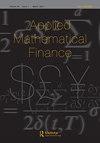使用神经- sde市场模型对冲期权书
Q3 Mathematics
引用次数: 2
摘要
我们研究了无套利的神经- sde市场模型对对冲期权产生有效策略的能力。特别是,我们使用这些模型推导出基于敏感性和基于最小方差的对冲策略,并使用真实世界的数据检查它们在应用于各种期权投资组合时的表现。通过对典型和压力市场时期的回测分析,我们发现随着时间的推移,神经- sde市场模型的套期保值误差始终低于Black-Scholes delta和delta-vega套期保值,并且对套期保值工具的基调选择不那么敏感。此外,使用市场模型的套期保值与使用赫斯顿模型的套期保值表现相似,而前者在市场压力时期往往更为稳健。本文章由计算机程序翻译,如有差异,请以英文原文为准。
Hedging Option Books Using Neural-SDE Market Models
We study the capability of arbitrage-free neural-SDE market models to yield effective strategies for hedging options. In particular, we derive sensitivity-based and minimum-variance-based hedging strategies using these models and examine their performance when applied to various option portfolios using real-world data. Through backtesting analysis over typical and stressed market periods, we show that neural-SDE market models achieve lower hedging errors than Black–Scholes delta and delta-vega hedging consistently over time, and are less sensitive to the tenor choice of hedging instruments. In addition, hedging using market models leads to similar performance to hedging using Heston models, while the former tends to be more robust during stressed market periods.
求助全文
通过发布文献求助,成功后即可免费获取论文全文。
去求助
来源期刊

Applied Mathematical Finance
Economics, Econometrics and Finance-Finance
CiteScore
2.30
自引率
0.00%
发文量
6
期刊介绍:
The journal encourages the confident use of applied mathematics and mathematical modelling in finance. The journal publishes papers on the following: •modelling of financial and economic primitives (interest rates, asset prices etc); •modelling market behaviour; •modelling market imperfections; •pricing of financial derivative securities; •hedging strategies; •numerical methods; •financial engineering.
 求助内容:
求助内容: 应助结果提醒方式:
应助结果提醒方式:


